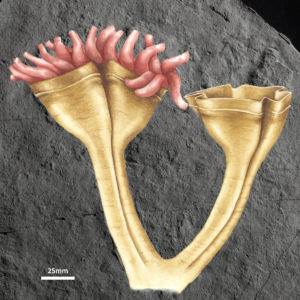by T. Joose, July 25, 2022, in Science

If you visited the oceans more than 500 million years ago, you’d find yourself in an alien world. Beings with quilted folds of soft tissue sat on the seabed like rugs, and life forms that looked like fronded plants but were actually animals made anchor on the ocean floor. But one organism might be somewhat familiar: a stalked, cuplike creature with waving tentacles resembling those of a jellyfish. The newly described fossil of this organism, named Auroralumina attenboroughiiafter naturalist and broadcaster David Attenborough, is between 556 million and 562 million years old and may be the oldest example of an evolutionary group still living today.
When co-author and University of Oxford paleobiologist Frances Dunn saw a cast of the fossil, she says, “It was instantly clear that this was really special and really rare.” With other fossils from the Ediacaran period, between 635 million and 541 million years ago, her first impression often is “What is this? How can I relate this to anything that’s alive today?” But with this specimen, she thought, “I know what this is.”
Classical scientific wisdom places the origin of modern animals about 539 million years ago during what’s called the Cambrian explosion. At this time, creatures with specialized tissues, organs, guts, and symmetrical left and right sides—all traits we recognize in the animals of today—began popping up.
…
by F. Menton, July 22, 2022 in MahattanContrarian
…
…
…
Here’s the problem. There is no sense in which the climate is an “emergency” within the ordinary meaning of that word in the English language. Predictions by climate models of a few degrees of temperature rise over the next century are the opposite of an “emergency.” Indeed, the statutes granting various “emergency” powers to the Executive all deal with the question of time periods too short to give the Congress time to enact legislation appropriate to the situation at hand. That circumstance is the opposite of what we have with the climate.
But if you are on the left, or a climate activist, this situation is just too important to wait for Congressional action that may never come. An “emergency” must be declared, to last for — how long? A hundred years? During which time, the bureaucrats can issue whatever orders they want, and spend whatever funds they want, all in the name of saving the planet. None of which will or can have any effect on the 85% (and growing) of world carbon emissions that come from outside the U.S. and which the U.S. government cannot affect in any way.
It’s all a huge insult to the intelligence of the American people. I doubt that the courts will be fooled, most particularly the Supreme Court.
by K. Richard, July 25, 2022 in NoTricksZone
A warmth-demanding plant can provide us with solid evidence of a much warmer than today Mid-Holocene climate.
Growth of the tropical aquatic plant ceases when air temperatures fall below 10°C.
A new study says that from about 8000 to 5000 years ago it was warm enough in winter that could grow at the 40°N latitude in northern China. Today its warmth threshold growth limit is ~34°N.
Scientists can therefore deduce the Mid-Holocene winter temperatures needed to have been “7.7°C higher than today” at that time.
….
by CCD Editor, July 25,2022 in ClimateChangeDispatch
Ron Barmby, author of “Sunlight on Climate Change: A Heretic’s Guide to Global Climate Hysteria” (Amazon, Barnes & Noble) spoke with Mike Ryan of TNT Radio (TNT Radio (podbean.com) about what he uncovered in the recent IPCC report, Climate Change 2021: The Physical Sciences Basis.
Ron’s findings: after being made famous by Al Gore and adopted by the IPCC, then being made infamous by its historical and statistical failings and subsequently dropped by the IPCC, the hockey stick temperature graph is back!
And a new narrative is being introduced that carbon dioxide has been demoted to causing only half of human global warming to date.
Mike discusses with Ron the four things wrong, and often in conflict with, the report itself with the latest doomsday science from the IPCC. LISTEN:
…
La géologie, une science plus que passionnante … et diverse

